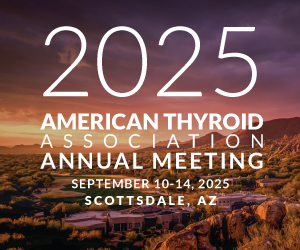September 26, 2007—The American Thyroid Association (ATA) recently awarded two 2007 grants for New Investigator-initiated research projects in the area of thyroid function and disease. The awards will assist new investigators to gather preliminary data for submission of a more substantial application to the National Institutes of Health or other granting organizations. Research grants of up to $25,000 annually were awarded for two-year terms, with renewals based on satisfactory progress reports from funded investigators in the fourth quarter of the first year.
The ATA also approved the renewal of the two 2006 ATA thyroid research grants, based on the current status of their research projects.
“As chairman of the ATA Research Committee for 2007, we reviewed many applications to arrive at two research projects addressing thyroid hormone mechanism of action and disease which were deemed the best qualified for funding,” said Irwin Klein, MD, professor of Medicine and Cell Biology at NYU School of Medicine and associate chairman in the Department of Medicine at North Shore University Hospital in New York. “In addition, two second-year grant were approved based upon their productivity and publications over the past 12 months. This work will be highlighted at the ATA’s upcoming annual meeting in New York on October 7, 2007.”
2007 Grant Recipients
 Helmut Grasberger, M.D.
Helmut Grasberger, M.D.
Research Assistant Professor, Endocrinology Section, University of Chicago Medical Center
Project: Application of Reverse Genetics in the Identification of Defects in the Dual Oxidase Maturation Factor in Humans
Thyroid hormone synthesis requires hydrogen peroxide produced by dual oxidases at the apical membrane of follicular thyroid cells. Helmut Grasberger, M.D. identified the dual oxidase maturation factors required for trafficking of dual oxidases from an intracellular compartment to the cell surface. By preventing intracellular accumulation of active oxidases, these maturation factors could provide a safeguard mechanism protecting thyrocytes from autotoxicity.
“Dysregulation of the concerted expression of dual oxidases and their maturation factors could cause chronic oxidative stress,” said Dr. Grasberger, “which has been linked to proliferative thyroid diseases.”
Dr. Grasberger will assess this hypothesis using transgenic mice lacking maturation factor activity. Results of these studies will provide a rational foundation for exploring the role of imbalance of the dual oxidase/maturation factor system in human disease. Bio
 Brian Kim, M.D.
Brian Kim, M.D.
Instructor in Medicine, Thyroid Section, Division of Endocrinology, Diabetes, and Metabolism, Brigham and Women’s Hospital
Project: Thyroid Hormone, Type 2 Deiodinase, and Energy Expenditure in Human Skeletal Muscle
Skeletal muscle is a major site of energy expenditure, and thyroid hormone is thought to have important metabolic effects in this tissue. Brian Kim, M.D. and his research team hope to determine which metabolic pathways are most sensitive to changes in thyroid hormone, utilizing cultured muscle cells and a novel system for measuring oxygen consumption and glycolysis.
“The work proposed here should shed light on a long-standing mystery in the thyroid field,” said Dr. Kim, “namely, how exactly thyroid hormone leads to increases in energy expenditure.” Bio
2006 Grant Renewals
The 2006 grant recipients were awarded second-year grant renewals:
Sara Danzi, Ph.D.
Assistant Professor of Medicine, Department of Medicine, NYU School of Medicine, North Shore University Hospital, and the Feinstein Institute for Medical Research, Manhasset, NY
Project: Novel Thyroid Hormone Based Therapies for Human Cardiac Disease
Chronic congestive heart failure in humans and animals is characterized by changes in myocyte gene expression, similar to those observed in the hypothyroid heart. Congestive heart failure is also associated with low serum T3 levels, which result from decreased 5’-monodeiodinase activity and impaired conversion of T4 to T3.
“Our lab is investigating the potential role for thyroid hormone or thyroid hormone analogs as novel treatment for patients with heart disease and congestive heart failure,” said Sara Danzi, Ph.D.
Dr. Danzi and her team hypothesize that the low serum T3 state that accompanies congestive heart failure further compromises the function of a diseased heart. Based upon this set of findings, they are testing the use of T3 and thyroid hormone analogs in a rat model of acute myocardial infarction leading to heart failure. Bio
Honey V. Reddi, Ph.D.
Asst. Professor of Medicine, Division of Endocrinology, Mayo Clinic and Foundation, Rochester, MN
Project: Determination of the oncogenic potential of PAX8/PPARy fusion protein (PPFP) and elucidation of its mechanism of action in follicular thyroid carcinoma
“It is a privilege to be selected for this award and I feel honored to be a recipient,” said Honey V. Reddi, Ph.D., “More importantly, this award demonstrates the immense support of the ATA to young investigators.”
Recent studies on follicular thyroid carcinoma (FTC) reported a novel chromosomal translocation, t(2;3)(q13;p25) fusing the thyroid-specific transcription factor PAX8 with the peroxisome proliferator-activated receptor gamma (PPARg) nuclear receptor, a ubiquitously expressed transcription factor, resulting in the expression of PAX8/PPARg fusion protein (PPFP).
In vitro studies in Dr. Reddi’s laboratory have demonstrated that PPFP has oncogenic potential. The focus of the research is to identify if PPFP can induce tumorigenesis in vivo and to examine in more detail its mechanism of action. Towards this end, a transgenic mouse expressing PPFP under the control of a thyroid-specific promoter will be generated and analyzed for PPFP’s potential to independently induce thyroid-specific tumors. There are no specific markers available for the detection, diagnosis or prognosis of FTC. Since PAX8/PPARg rearrangements occur in ~42% of FTC, this study will further our understanding of PPFP’s role in the genesis of FTC and provide clinically useful information for the management of FTC. Bio
For more information, please contact the ATA at thyroid@thyroid.org.



